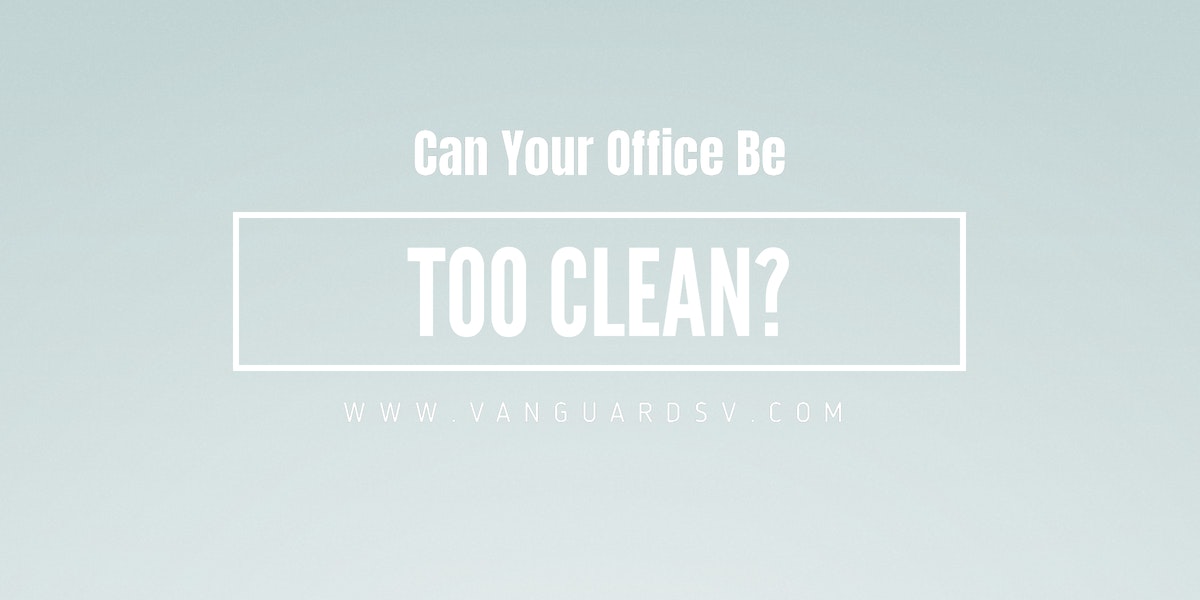With the widespread dissemination of information regarding the dangers of ultra-sterile environments, as well as the products used to clean and disinfect them, one might feel entitled to ask--is my office or classroom too clean?

Is it Posible to be Too Clean?
According to the Merriam Webster dictionary, clean is defined as;
Free from dirt or pollution.
In the modern work or educational environment, we can safely add free from germs or bacteria that cause diseases, chemicals that make us sick, and clutter that drives us insane.
However, due to a flawed understanding of the nature of the microbial matter that surrounds our world, we may have taken the definition and our attempts to eradicate disease a step too far.
We have known since the late 19th Century – and the discoveries of German physician Robert Koch – that certain bacteria cause specific diseases.
Since then, sanitation and cleanliness have dramatically improved our health.
Yet not all microbes are bad.
Yes, there are bacteria that cause unpleasant or even deadly diseases, but lots of them are extremely useful and beneficial to our health.
They make vitamins in our gut, coat our skin to protect us from harmful microbes, and help us digest food.
Outside of our bodies, they decompose organic waste, make half the world's oxygen and fix nitrogen levels in the air – helping make the Earth the life-supporting planet it is.
Today, many scientists argue that people have become “too clean” for their own good.
The issue as it is currently understood is two-fold.
- We are systematically destroying microbial matter that is not only helpful to our environment, but helps prevent the growth of dangerous bacteria, and;
- The eradication of environmental germs has led to the unintended consequence of creating a generation of people with weak immune systems that are prone to allergies and asthma.
According to NBC News;
Scientists came up with the hypothesis as a way to explain the explosion of allergies and asthma in America’s youth.
And what they discovered was intriguing, if a little disconcerting: kids who grow up in less tidy environments end up with a lower risk of developing sensitivities to benign substances, like pollen and dog dander.
A study released in June added to the growing mound of evidence that the too-clean-for-health hypothesis might be on track.
That study, published in the Journal of Allergy and Clinical Immunology, found that Amish children who were raised on farms were less likely to develop allergies and asthma than their peers.
How to Improve Environmental Health Without Being Too Clean
As demonstrated, the environmental and personal health benefits to germ and bacteria exposure are coming to light.
However, an excessive buildup of pathogens and dangerous mold or bacteria is just as, if not more dangerous to everyone.
So, what can we do to maintain an equilibrium of healthy and productive cleanliness without going overboard and eradicating bacteria that is good for the environment, as well as our immune systems?
The first step is to take an honest assessment of the cleaning and disinfection products that we use and are exposed to every day.
The hard reality is that most of them are toxic--many being linked to everything from asthma to cancer, endocrine damage, and reproductive issues.
Certified green cleaning products, outside of a healthcare environment, have been shown to produce the same level of cleanliness and disinfection as their poisonous counterparts without the dangers of harmful chemical exposure.
The next step is to understand how germs are spread and what we can do to prevent that proliferation.
According to Dr. Philip Tierno, the director of microbiology and clinical immunology at New York University Medical Center in New York City;
Infectious diseases are still the leading cause of death worldwide and [...] 80 percent of those diseases are transmitted by touch.
Yet [...] less than 50 percent of us wash our hands on a regular basis and almost none of us do it right.
References & Resources
- Amish children living in northern Indiana have a very low prevalence of allergic sensitization
- Can you be too clean?
- Can your home be too clean?
Takeaway
While the applicable definition of cleanliness appears to be entirely subjective, the practical application should achieve a balance between the health of building occupants, the function of the facility, and the reality that too clean is dangerous for healthy adults and children, especially combined with the over-application of chemical cleaning and disinfectant products.
A clean for health first approach places the wellbeing of facility occupants above all.
To achieve this at a consistent level, it is necessary to employ the right products and equipment while maintaining a highly trained and dedicated facilities management and custodial team.
Often, that is outside of the budget for many schools and businesses, underscoring the enormous advantages of outsourcing.
If you would like to learn more about the health and performance benefits of environmentally-safe, clean for health first commercial cleaning practices and products for your school or business, or would like to schedule a free, no-obligation onsite assessment of all of your facilities infection prevention and control requirements, contact us today for a free quote!
In Bakersfield CA, call (661) 437-3253
In Fresno CA, call (559) 206-1059
In Valencia CA, or Santa Clarita CA, call (661) 437-3253

